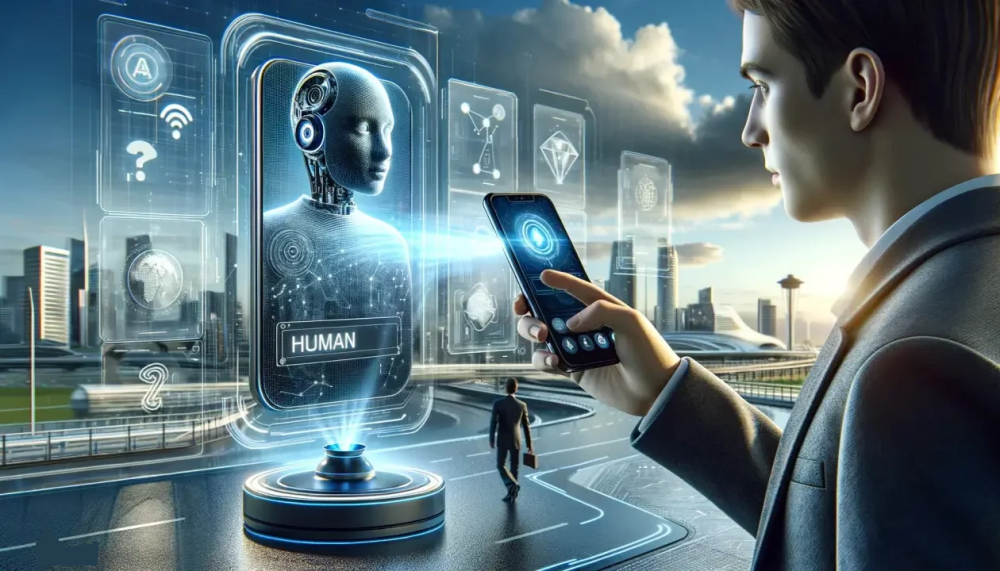In recent years, artificial intelligence has become an integral part of our daily lives, and it has been evident in the smartphones we use. From improving user experience to providing new features that help us manage our lives better, artificial intelligence has become a pivotal force in the world of modern technology. In this section, we will learn about how artificial intelligence affects smartphones and some of the aspects that improve our daily lives.
What is artificial intelligence in phones?
Artificial intelligence in smartphones means using advanced technologies to analyze data, simulate human mental processes, and make decisions based on these analyses. The goal is to improve the user experience and provide smart and advanced solutions. Thanks to artificial intelligence, phones are now able to recognize patterns and behaviors, which enables them to provide personalized services that meet the user’s needs.
How does artificial intelligence technology work?
Basically, smartphones rely on artificial intelligence in many aspects that contribute to enhancing performance and efficiency. For example, smartphones use artificial intelligence to analyze data received from sensors such as the camera, microphone, or motion sensors. These analyses allow the phone to make intelligent decisions, such as automatically adjusting the screen brightness based on the surrounding environment or providing app suggestions based on user behavior.
Rapid developments in artificial intelligence
Technology is constantly evolving, and artificial intelligence in smartphones is no different. Every year, we see new improvements that make smartphones smarter and more efficient. For example, modern phones are now able to learn user behavior more accurately. Thanks to machine learning algorithms, the phone can anticipate your needs before you ask for them, such as opening certain apps at specific times or adjusting settings to your preferences.
Improve camera experience with AI
One of the most prominent uses of artificial intelligence in smartphones is to improve the photography experience. Just a few years ago, smartphone cameras were simply a tool for taking photos and videos. Today, thanks to artificial intelligence, cameras are more advanced than ever.
Smart cameras now use artificial intelligence to automatically recognize scenes. For example, if you’re shooting in a dark room, the phone can automatically adjust the lighting so you get the best possible photo. Cameras are also able to recognize faces and objects and enhance details automatically. These features make shooting easier and more accurate, even for users who are not experienced in photography.
Automatic recognition of faces and objects
AI isn’t just about improving quality, it goes beyond that to automatically recognize faces and objects. Using advanced algorithms, the phone can recognize people in the photo and automatically adjust the shooting settings to enhance facial details. In some phones, you can even add special effects to photos based on what the phone detects, such as changing the lighting or background.
Moreover, AI can recognize different types of objects such as animals or famous landmarks. If you are on a tourist trip, the camera can distinguish between landmarks and capture them better than taking a normal photo.
Artificial Intelligence in Voice Assistant Applications
Another common use of AI in smartphones is voice assistant applications. We now use voice assistants like Siri and Google Assistant on a daily basis to help us accomplish various tasks. Using AI, the voice assistant can analyze your questions and understand your intentions more accurately. If you are asking for directions to a certain place, the voice assistant can determine the best location based on current traffic.
How Voice Assistant Helps You in Your Life
Voice assistants don’t just answer questions. They’ve become smart tools that can manage your daily life. For example, you can ask your voice assistant to organize your appointments, send text messages, or even adjust your phone settings like adjusting the volume or activating “Do Not Disturb” mode. All of these tasks are done automatically based on how AI interacts with your behavior.
Smart control of devices via phone
With AI, your smartphone can control other devices in your home, such as lighting, air conditioning, and smart home appliances. In this way, your phone can act as a complete control center, saving you the hassle of navigating between different devices. Voice assistants also contribute to this kind of smart interaction, as you can just speak to turn the lighting fixture in your living room to warm light or even turn on the air conditioner.
Intelligent interaction with users
Smartphones powered by AI are able to interact with you in intelligent and personalized ways. For example, some phones monitor your usage and adjust their settings based on what you do on a daily basis. If you open certain apps at certain times, the phone can automatically open those apps for you at your preferred time.
Learning from your phone behavior
One of the biggest benefits of AI is the ability to learn from your personal behavior. Smartphones are now not just tools that execute commands, they are able to understand your lifestyle and needs. If you are using an app frequently at a certain time, the phone will automatically direct you to it, making use more seamless and convenient.
Adapt to your personal style
In addition, AI can adapt to your personal style of using the phone. For example, if you always like to play some music at a certain time of the day, the phone will provide music suggestions based on your personal taste. Intelligent interaction makes the phone better understand your needs and provide you with a better experience.
Improved performance and smart applications
As artificial intelligence advances, smartphones are becoming able to improve their performance based on user behavior. These improvements include everything from app launch to phone memory management. AI algorithms monitor app and resource usage in real time, allowing the phone to intelligently allocate resources to ensure apps run smoothly and without disruption.
For example, AI can manage apps that are open in the background and close apps that are not being used well, which helps improve the phone’s response speed. This means that smartphones are becoming smarter in how they allocate memory and processing for multiple purposes at once, without affecting overall performance.
Artificial intelligence also improves the experience of games and applications that require large resources. Using this technology, the phone can automatically adjust the graphics settings to suit the overall performance, ensuring you have a smooth user experience without any slowdown or problems.
Future expectations for artificial intelligence in phones
As we live in a rapidly changing era, we can expect to see significant improvements in how AI is used in smartphones. In the future, we will see more innovations that will make phones more advanced than ever before. These innovations may include improvements in natural language understanding, where phones will be able to interact with you in a more realistic and natural way.
In addition, AI can further accelerate the use of augmented reality (AR) and virtual reality (VR) technologies. As these technologies evolve, smartphones will become more capable of supporting advanced experiences that include live and immersive interactions.
We may also see advanced AI-based applications to enhance the distance learning experience, and provide personalized health tools, such as analyzing biometric data to provide health advice based on user behavior.
Ultimately, AI in smartphones is not just a technical feature, it’s a radical change in how we interact with our devices. Over time, we’ll see more development in this area, enabling us to benefit from more personalized experiences.

